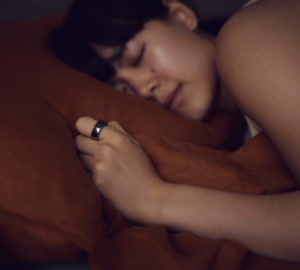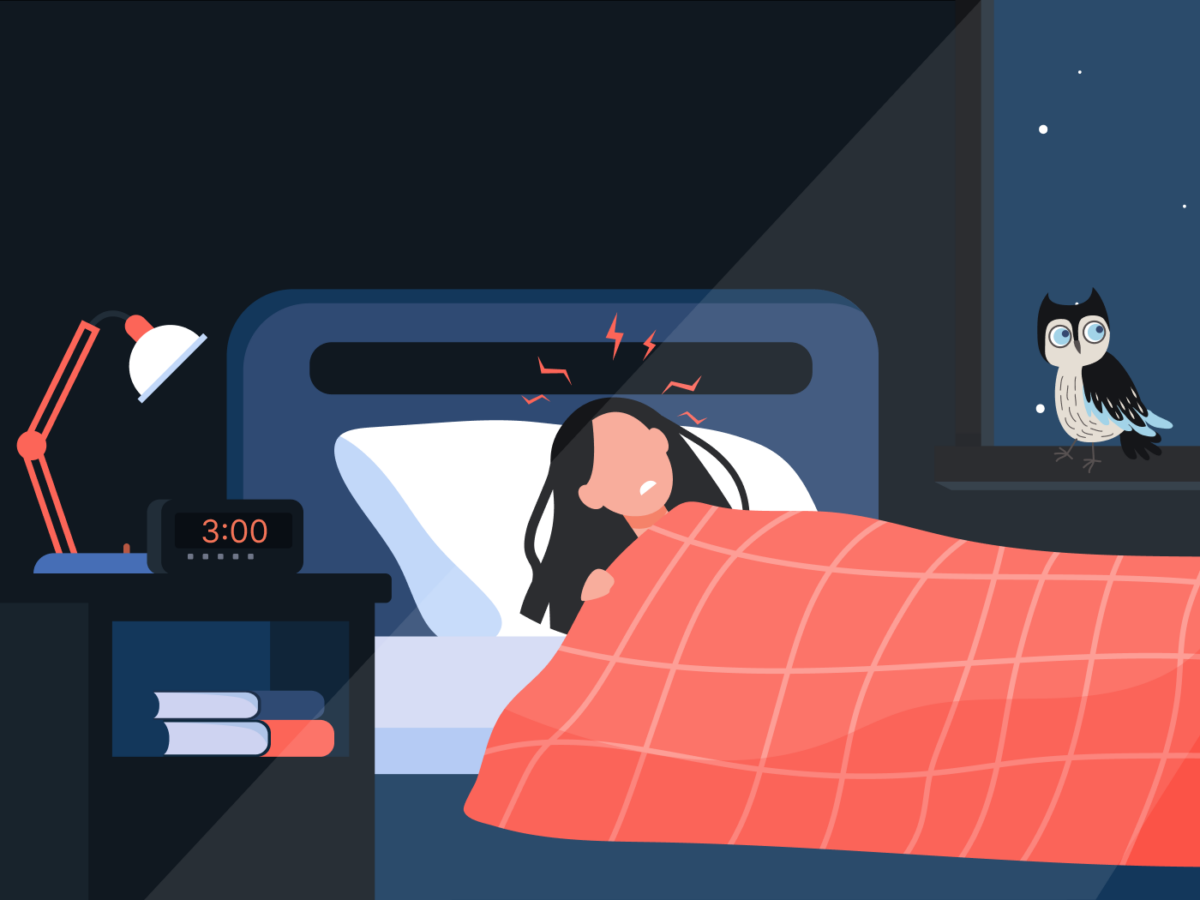If you’re one of the 35% of people who wake up in the middle of the night at least three times per week, you know how frustrating it can be.
Not only does it impact your mood, energy levels, and concentration, it can also have adverse effects on your overall well-being.
If you regularly wake up in the middle of the night, there are a few tips that may help you get back to sleep. Below, find out what to do if you’re lying awake at 3 a.m. and some of the underlying lifestyle factors that may be contributing to your nighttime awakenings.
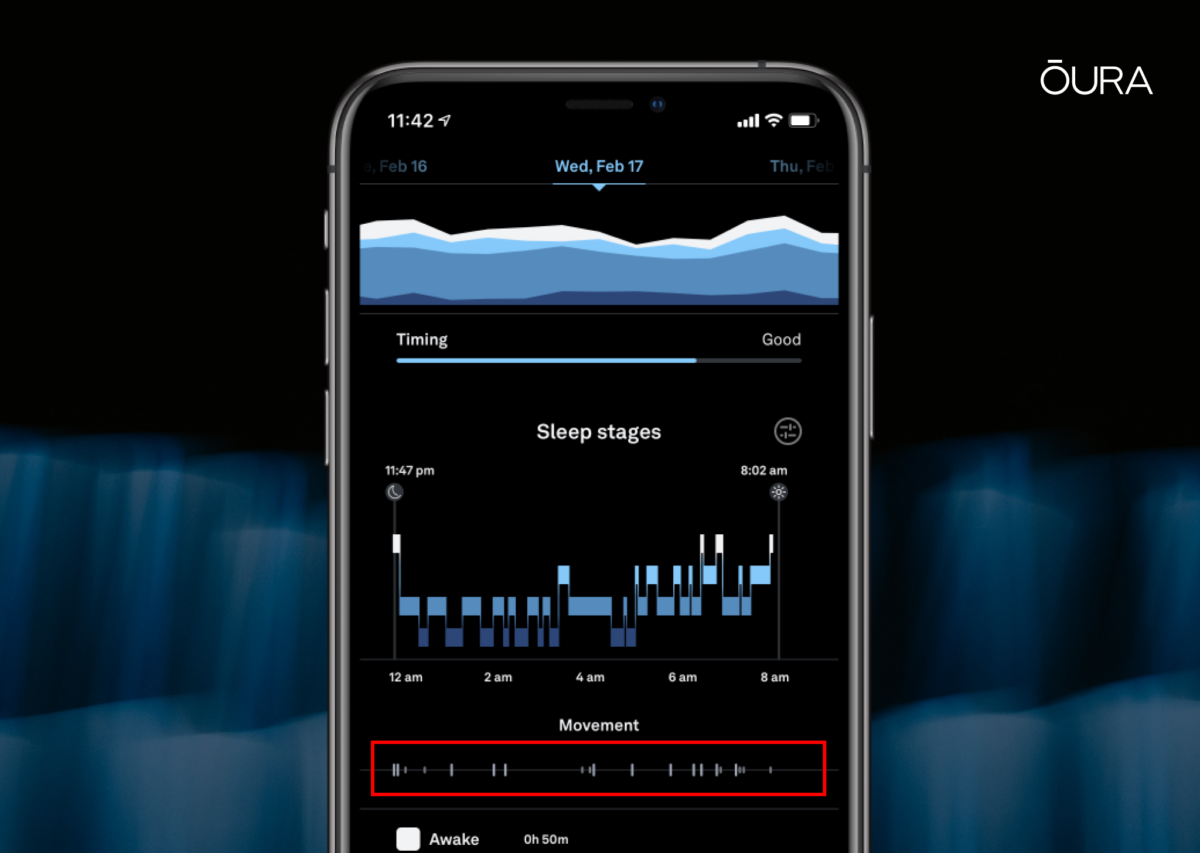
| Member Tip: In your Oura App, the Sleep Tab can provide some clues as to what might be happening at night. For instance, your Sleep Graph will show you how many times you wake up in the night and how long it takes you to fall back to sleep each time, as well as your total hours of sleep. You’ll also notice your nighttime movement graph, which can point out which times of the night you’re most restless. |
RELATED: Restless Sleep? How to Reduce Tossing and Turning at Night
What To Do When You Wake Up at 3am
Waking up in the middle of the night and not being able to get back to sleep can be stressful and frustrating—and the more you stress about it, the worse it gets. For instance, research has shown that “clock watching” can make it harder for people with insomnia to go back to sleep.
First of all, keep in mind that it’s relatively common to wake up in the middle of the night. As Oura advisor and sleep researcher Rebecca Robbins, PhD, says:
“Realize that it can be common, but when you struggle, the important thing to keep in mind is that staying in bed, tossing and turning, will make the problem worse. When you toss and turn, get out of bed, keep the lights low, and do something relaxing, like a couple gentle yoga poses or meditation exercises.”
Getting out of bed and doing something relaxing will help your brain maintain an association between your bed and sleeping, rather than being awake. When you start to feel tired, you can go back to bed.
Recommended activities to fall asleep quickly include:
- Listening to a guided meditation, relaxing music, or sleep sounds
- Reading a book
- Deep breathing exercises
- Progressive muscle relaxation techniques
One thing you should avoid doing when you wake up at 3am? Do not look at your phone or other electronic devices. The light can interrupt melatonin production, preventing you from going back to sleep.
READ MORE: How Blue Light Impacts Your Sleep
Why Do I Always Wake Up at 3am?
Below are some lifestyle habits that could be the culprit behind your middle-of-the-night wake-ups, plus potential solutions to sleep more soundly in the future.
1. Elevated Cortisol Levels
Cortisol, the stress hormone, is involved in a number of key processes, including regulating your sleep-wake cycle. Alongside other hormones like melatonin, cortisol is produced cyclically in tune with your circadian rhythm. Your cortisol levels start to rise in the early morning usually at around 3am and peak in the first hour after waking. This is the cortisol awakening response, and it helps you feel awake and energized in the morning.
However, elevated cortisol levels – either from a medical condition or excess stress—can disrupt this diurnal rhythm. So as your cortisol levels naturally rise at 3am, they might spike excessively, waking you up.
Additionally, stress can impact your sleep architecture, preventing you from moving seamlessly through each sleep stage. This can also be responsible for those middle-of-the-night wakeups.
Solution: If you notice your stress levels are often elevated, try to incorporate more stress management techniques, like breathwork, exercise, and time in nature.
| Member Tip: Using Oura’s new Daytime Stress feature, you can also monitor your stress levels throughout the day and learn which recovery tactics help to bring your body into a state of calm. Oura’s new Stress feature. |
READ MORE: How Stress Affects Your Sleep
2. Your Dietary Choices
 Consuming the wrong foods and drinks can significantly disrupt your sleep patterns. For instance, eating too close to bedtime can keep your digestive system working even as the rest of your body winds down for sleep.
Consuming the wrong foods and drinks can significantly disrupt your sleep patterns. For instance, eating too close to bedtime can keep your digestive system working even as the rest of your body winds down for sleep.
Large meals in the evening can cause indigestion, heartburn, or acid reflux, especially if you lie down soon after eating. This is because when you’re in a horizontal position, it’s easier for stomach acid to flow back into the esophagus, leading to discomfort and potential sleep problems.
Additionally, eating can rev up your metabolism, which can raise your body temperature. An increased body temperature can interfere with your body’s ability to fall asleep, as a cooler body temperature is more conducive to sleep.
Blood sugar may also be playing a role in your sleep issues. For instance, a meal that’s rich in sugars or simple carbohydrates can cause a spike in blood sugar. Research indicates that in healthy individuals, blood sugar rises during sleep. However, a sugar spike before bed can cause your blood sugar to crash during the night, causing early-morning awakenings.
If you have diabetes or insulin insufficiency, your body doesn’t release enough insulin to regulate this natural blood sugar rise – known as the “dawn phenomenon.”
Consuming large amounts of caffeine, alcohol, or nicotine, especially later in the day, can also disrupt sleep. Finally, if you find yourself taking regular bathroom breaks during the night, it could be from drinking too much water before going to bed.
READ MORE: How Does Alcohol Impact Oura Members?
Solution: Eat your last meal at least two to three hours before bedtime, and stay away from carbohydrate-rich foods right before you go to sleep. If you’re hungry before bed, eat a light snack that balances protein, fats, and carbs.
| Member Tip: Log your meals on the new Oura Labs feature Meals, to see how what you eat affects your sleep. |
RELATED: 8 Foods and Drinks for Better Sleep (and the 4 to Avoid!)
3. A Less-Than-Ideal Sleep Environment
Your sleep environment includes everything that surrounds you when you sleep, and making a few adjustments can improve your sleep quality and prevent frequent sleep disruptions.
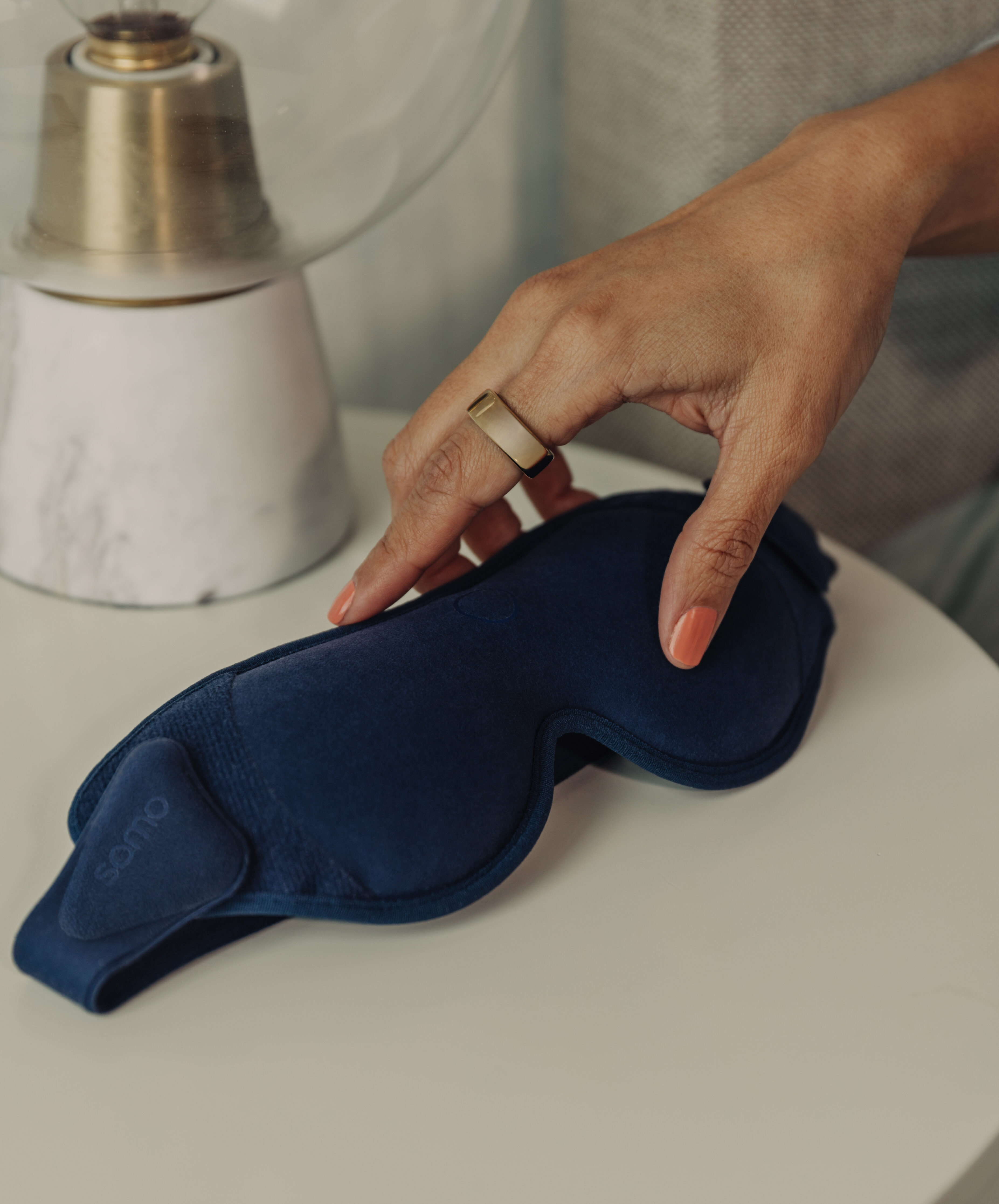 Here are a few factors to consider to help you get a good night’s sleep.
Here are a few factors to consider to help you get a good night’s sleep.
Light Exposure: Light, especially blue light from electronic devices, can suppress melatonin production, which can make you have trouble falling asleep. Even ambient light from streetlights or a full moon can disturb some people.
Solution: Use blackout curtains or wear a sleep mask and limit screen time before bed.
Noise: Sudden or loud noises, such as from traffic, neighbors, or alarms, can jolt you awake, interrupting important restorative sleep phases like deep sleep and REM sleep. This can increase your stress hormones—such as adrenaline and cortisol—and elevate your heart rate and blood pressure, further fragmenting your sleep.
Solution: Fill your room with soft materials like cushions, rugs, and curtains to absorb unwanted noise. Additionally, try using earplugs, white noise machines, or apps that play calming sounds.
| Member Tip: In Explore content in the Oura App, you’ll find a variety of meditations, stories, and sleep sounds that can help you fall—and stay—asleep. |
Ambient Temperature: A room that’s too hot or too cold can disrupt the sleep cycle—although research indicates that high temperatures are more detrimental to sleep quality than low temperatures.
Optimal sleep typically occurs in a slightly cool environment, typically between 60° and 68°F (15.6°-20°C), since your core body temperature lowers during sleep. Additionally, new research indicates a link between body temperature and REM sleep cycle length.
Solution: Adjust the thermostat, use appropriate bedding, or employ fans or heaters as needed.
Uncomfortable Bedding: An old mattress, lumpy pillows, or scratchy sheets can cause physical discomfort, leading to frequent awakenings.
Solution: Invest in a good-quality mattress, comfortable pillows, and soft bedding. Learn how to choose better bedding for a good night’s sleep.
Allergens: Dust mites, pet dander, and pollen can trigger allergies, causing symptoms like sneezing, itching, or difficulty breathing, which can disrupt your sleep.
Solution: Regularly clean and vacuum the bedroom, use hypoallergenic bedding, and consider using air purifiers.

Pets: We know you love sleeping with your furry friend, but animals can move, make noise, or even take up too much space, leading to sleep disturbances.
Solution: Train pets to sleep in their own beds or designate a specific area for them.
Unpleasant Odors: Strong or unpleasant smells can be distracting and make it difficult to relax and fall asleep.
Solution: Ensure good ventilation, consider using calming essential oils or scents, and avoid strong-smelling foods or products in the bedroom.
Interruptions: Being woken up by family members, roommates, or unexpected phone calls can disrupt your sleep cycle in the middle of the night.
Solution: Communicate your sleep schedule to those you live with and consider turning off your phone or using “Do Not Disturb” mode.
3. Your Sleep Schedule
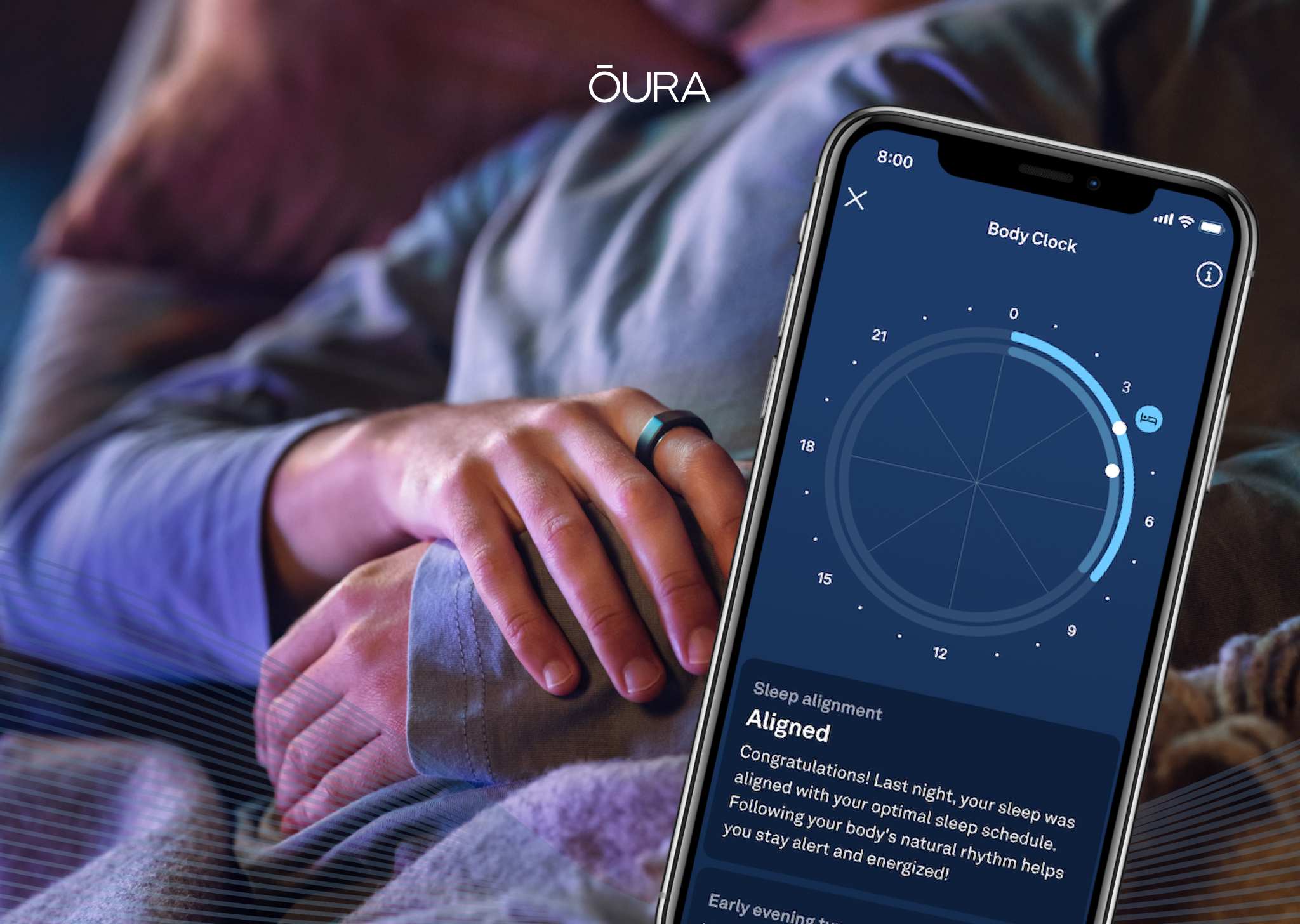
Going to bed and waking up at different times can confuse your body’s internal clock, which can make it hard to fall and stay asleep. Your circadian rhythm is genetically hardwired and influences when your energy levels, hunger, and alertness. You may not realize it, but you often feel best when your lifestyle aligns with your body’s natural rhythm.
Solution: Aim to maintain a consistent sleep schedule, even on weekends.
| Member Tip: In the Oura App, the Body Clock feature bases your ideal sleep window on your personal chronotype — the biological baseline or circadian rhythm that determines when you are at your most active and alert. |
4. Stress
Stress is the body’s mental and physiological response to a perceived threat, which can rear up when you feel anxious, worried, under pressure, overwhelmed, or in danger.
Unfortunately, your body can’t tell the difference between the stress of being chased by a lion and the stress of work deadlines, family obligations, or financial worries. Stressing over these problems can impact sleep quality and create a feedback loop of stress and poor sleep.
Solution: Create a bedtime routine that helps you wind down and tells your brain and body it’s time to get some rest. Experiment with yoga, guided meditations, or breathing exercises, and track your Oura data to see how they affect your sleep.
READ MORE: 9 Simple (And Science-Backed!) Ways to Reduce Stress
5. Hormonal Changes
Menopause—and its accompanying symptoms, like hot flashes and night sweats—can lead to sleep changes and cause poor sleep. Roughly half of all people going through menopause experience insomnia and other sleep problems.
Solution: Practice good sleep hygiene, avoid caffeine and large meals late in the day, and consider incorporating light exercise into your routine—research shows that regular exercise can improve sleep quality. Additionally, try some deep breathing exercises or relaxation techniques before bed to help you relax and unwind, or consider speaking to your healthcare provider about hormone replacement therapy (HRT).
RELATED: How Does Menopause Affect Sleep?
Why Do I Wake Up After Only 2 Hours of Sleep?
Maybe your issue isn’t that you wake up at 3am. Maybe it’s that you wake up soon after falling asleep—perhaps just an hour or two. Why does this happen? It can often be linked to specific triggers that disrupt the transition into deeper sleep stages, which usually happens in the first hour or so after falling asleep. Noise, temperature fluctuations, or light pollution can be the culprit.
Eating a heavy meal or spicy foods may trigger indigestion or acid reflux, which also may wake you up as this reaction tends to worsen in the hours following eating. While staying hydrated throughout the day is vital for good sleep, you don’t want to drink too much in the hour before bed. Otherwise, you might be waking up after just a couple of hours to use the bathroom.
| Member Tip: Check your Sleep Graph to see what time you woke up—look for the white sections to see your awake times. |
When To Be Concerned about Waking Up at 3am
While adjusting lifestyle factors will be enough to help many people sleep better, some may find the problem persists. Consult your healthcare provider if you experience any of the following symptoms.
- Waking up frequently in the middle of the night consistently for several weeks or long
- Excessive daytime sleepiness
- Breathing difficulties, such as waking up gasping for air, choking, or coughing
- Mood changes, such as irritability, depression, or anxiety
- Restless legs, especially the urge to move them as you’re trying to fall asleep
- Frequent nightmares or night terrors
- A change in your sleep quality after starting a new medication
Finally, be aware of other concerning sleep behaviors: Unusual behaviors during sleep, such as sleepwalking, talking, or other unusual movements, it’s worth talking to your doctor. Check your Sleep Contributors such as Restfulness in the Oura App to detect excessive nighttime movements.
FAQs About Waking Up at 3am
Why do I wake up at 3am?
There are many reasons why you wake up at 3am, from stress and anxiety to environmental disruptions like noise or light. A cortisol spike at 3am — the natural rise of the stress hormone that helps prepare your body to wake — can also play a role. If your stress levels are already elevated, this spike may wake you up more abruptly.
Why do I always wake up at 3am?
If you’re wondering why you always wake up at 3am, it may be tied to recurring lifestyle factors. Eating too close to bedtime, drinking alcohol or caffeine late in the day, or having an inconsistent sleep schedule can all increase the likelihood of middle-of-the-night awakenings.
Why do I keep waking up at 3am?
Stress, hormonal changes, and even temperature fluctuations in your bedroom can cause people to keep waking up at 3am every night. In some cases, conditions like sleep apnea or restless legs syndrome may also be contributing.
Is waking up at 3am every night normal?
Occasionally waking up during the night is normal. But if you say, “I keep waking up at 3am every night,” and it’s been happening for weeks, it may be worth investigating. Persistent awakenings can signal issues like poor sleep hygiene, elevated stress, or underlying health conditions.
How can I get back to sleep after waking up at 3am?
If you find yourself waking up at 3am, the best approach is to avoid clock-watching and get out of bed to do something calming — like reading, meditating, or deep breathing — until you feel sleepy again. Keeping lights low and avoiding screens will help your brain re-associate your bed with sleep.
When should I be concerned about waking up at 3am?
If you keep waking up at 3am and experience daytime fatigue, mood changes, or symptoms like gasping for air, frequent nightmares, or restless legs, it’s important to speak with a healthcare provider. These can be signs of a sleep disorder or another underlying condition.
RELATED: 9 Science-Backed Herbs and Supplements for Better Sleep
About the Oura Expert
Rebecca Robbins, PhD, is an Instructor in Medicine at Harvard Medical School and an Associate Scientist at the Brigham and Women’s Hospital. Her research uses marketing and novel communication tools and technologies (i.e. smartphones and other mobile devices) to design persuasive behavior change interventions to improve sleep and circadian health. In 2011, Dr. Robbins co-authored Sleep for Success! with Dr. James B. Maas. Dr. Robbins’ research has appeared in the New York Times, the Financial Times, and Readers’ Digest, and she has appeared on The Today Show, Live! With Kelly Ripa and Ryan Seacrest, Fox Business News, ABC Nightline, CNBC, and CBS This Morning.








